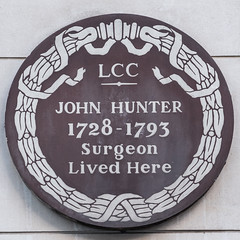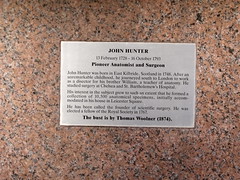John Hunter FRS


John Hunter FRS
(1728-1793)
Commemorated on 4 plaques
John Hunter 1728-1793 surgeon lived here
31 Golden Square, Westminster, W1, London, United Kingdom where they lived
Here dwelt John Hunter, F.R.S. 1785. B.1728. D.1793.
12 South Parade, Bath, United Kingdom where they lived
John Hunter, 13 February 1728 - 16 October 1793, Pioneer Anatomist and Surgeon. John Hunter was born in East Kilbride, Scotland in 1728. After an unremarkable childhood, he journeyed south to London to work as a disector {sic} for his brother William, a teacher of anatomy. He studied surgery at Chelsea and St. Bartholemew's {sic} Hospital. His interest in the subject grew to such an extent that he formed a collection of 10,500 anatomical specimens, initially accommodated in his house in Leicester Square. He has been called the founder of scientific surgery. He was elected a fellow of the Royal Society in 1767. The bust is by Thomas Woolner (1874).
John Hunter bust, Leicester Square, London, United Kingdom where they is commemorated
The birthplace of two great Scotsmen William Hunter born 23 May 1718 died 30 Mar 1783 & John Hunter born 13 Feb 1728 died 16 Oct 1793 pre-eminent in medicine and surgery
former Hunter House Museum, Maxwellton Road, G74 3LW, East Kilbride, United Kingdom where they was born (1728)




